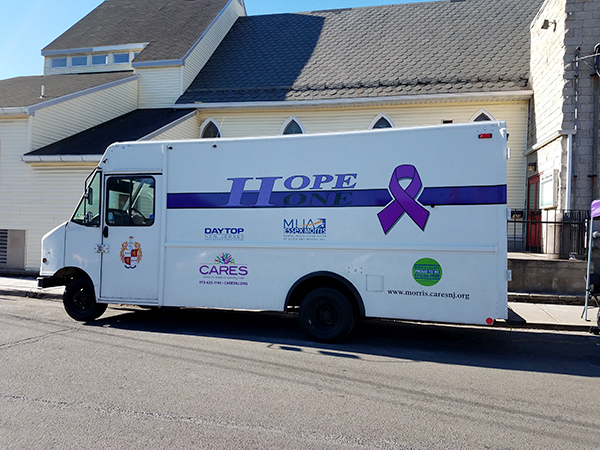
Hope One Celebrates 6th Anniversary
County of Morris
Morris County Sheriff James M. Gannon recently honored the 6th Anniversary of his department’s heralded Hope One program with a symposium at the County College of Morris in Randolph that focused on responding to the nation’s opioid overdose epidemic.
More than 200 participants joined the event, where law enforcement officers and community partners from throughout the state shared best practices, ideas and information about community programs that combat the opioid epidemic. The event included presentations from the New Jersey State Police Drug Monitoring Initiative, Habitat for Humanity, as well as a panel discussion by current Hope One staff from throughout the State of New Jersey and remarks from Morris County leaders.
“There is no secret that across America and beyond, this opioid epidemic was happening, and we wanted to make a difference. So, what do we need to do? We need to focus on the at-risk population, and the second and final piece is bringing services to them. That’s it; it’s not complicated,” said Sheriff Gannon.
Hope One sends professionals trained in addiction services into the community, via a mobile recovery unit, where they encounter people in need of addiction services and who are at risk of overdose. Hope One teams, which have been copied throughout the nation, connect individuals they meet with treatment services and train citizens how to deal with someone who overdoses, specifically in the use of Narcan to revive overdose victims.
Morris County Sheriff’s Office Cpl. Erica Valvano is the driving force behind the Hope One mobile substance use recovery and mental health initiative, working closely with individuals impacted by the opioid epidemic and sharing lessons learned to inspire other agencies to replicate the program. Hope One marks its 6th Anniversary with over 35,000 community contacts and over 6,000 people trained in the use of lifesaving Narcan.
The symposium also marked the 2nd Anniversary of the Hope Hub program, a multidisciplinary panel made up of law enforcement, social services, mental health services, healthcare providers, treatment providers and recovery specialists. When representatives of various agencies identify struggling individuals and families, Hope Hub’s professionals, spearheaded by Hope Hub Coordinator Officer Chelsea Whiting and Social Case Worker Jaimie Bingham, work to connect with them and link them to life-changing services.
Hope Hub has intervened in 350 situations of individuals or families at an acutely elevated risk.
“Although drug-related deaths continue to rise around the country, the good news for New Jersey is they are declining. They went down 7% last year and they are down 12% this year relative to 2022,” stated Detective Sergeant Kevin Coyle of the New Jersey State Police’s Office of Drug Monitoring and Analysis.
The Morris County Sheriff’s Office, in partnership with the Morris County Department of Human Services, the Mental Health Association and the Center for Addiction Recovery Education and Success (CARES), staffs the Hope One unit with a plain clothes Sheriff’s Officer, a Certified Peer Recovery Specialist and a Mental Health Professional. In 2019, this team was awarded the International Association of Chiefs of Police/Security Industry Association (IACP/SIA) Michael Shanahan Cooperation in Public/Private Partnership Award. In 2021, Hope One presented as a Dynamic Co-Responder Model to Address Behavioral Health Concerns in Your Community for the annual IACP conference.
The Morris County Sheriff’s Office Hope One Project is proud to introduce the following replicated programs in New Jersey counties: Atlantic County, Burlington County, Cape May County, Hunterdon County, Monmouth County, Passaic County and Warren County; and the City of Newark.
This past February 2023, the Hope Hub team was invited to present their program at the National Sheriff’s Association Winter Conference.
In the Hope Hub program, individuals and families struggling are connected to life-changing services. Each week, the Hope Hub panel meets to determine if the individual or family would benefit from various service sectors. Applicable agencies then work together as a team to do a door knock or intervention.

